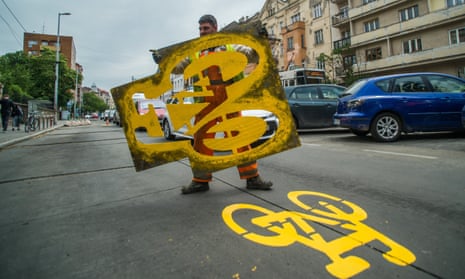The mayor of Athens has said he will “liberate” public space from cars. His counterpart in Paris says it is out of the question for the city to return to pre-coronavirus traffic and pollution levels. In Berlin, 14 miles (22 km) of new bike lanes have appeared almost overnight.
Around the world, from Dublin to Sydney, cities are being radically reshaped in favour of cyclists and pedestrians as empty streets give authorities the opportunity to implement and accelerate large-scale projects.
Cycling advocates and environmental activists are urging governments to ensure the revival is long-term and lasts beyond the pandemic, for fear of a pushback by the car lobby.
The Greek capital is embarking on one of the most ambitious rejuvenation schemes, which has been hastened by the pandemic, according to its mayor, Kostas Bakoyannis. He announced plans last week to allocate 50,000 square metres of public space for cyclists and pedestrians.
At the heart of the scheme will be a four-mile “grand walkway” uniting archaeological sites in the historic centre. Pavements will be widened, boulevards pedestrianised, squares enlarged and traffic banned from areas beneath the Acropolis.
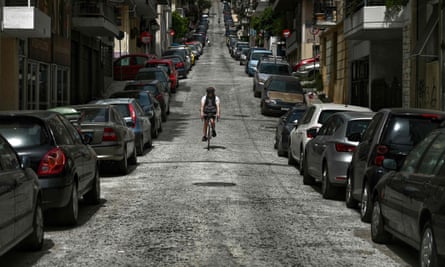
Bakoyannis, who became Athens’ youngest mayor last year, openly admits that the pandemic played a role in accelerating infrastructure works that might have taken years to accomplish.
“We have this once-in-a-lifetime opportunity and are fast-forwarding all our public works,” he said. “The goal is to liberate public space from cars and give it to people who want to walk and enjoy the city … Athens will be cleaner, greener and better lit.”
In Budapest, 12 miles of temporary bike lanes have been introduced on some of the city’s busiest roads over the past month.
The city’s mayor, Gergely Karácsony, who was elected last year on a largely green platform, had little trouble introducing the lanes after many people expressed their discomfort at the prospect of depending on the city’s excellent but usually packed public transport system during the pandemic.
The mayor’s office said it was monitoring traffic levels and that some of the temporary lanes may remain once life gets back to normal. It is planning a public consultation over where and how to introduce more bike lanes in the future.
Around 20 miles of temporary bike lanes have been set up across Paris, much to the disgruntlement of car lobbyists who have protested to city hall that their rights are being squeezed. Main roads such as the Rue de Rivoli and Rue Saint Antoine, a major east-west route, are gradually being sealed off to private vehicles and there are proposals for a further 30 miles of bike lanes in the city.
Many Parisians are being offered €50 toward getting old bikes repaired as part of the French capital’s €20m (£18m) planvélo to encourage the use of bicycles.
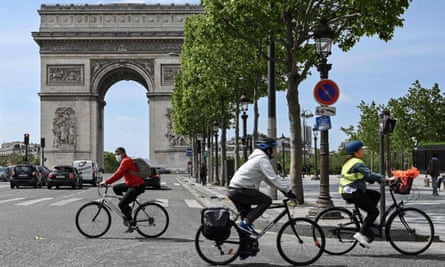
Those supporting the new push for bike travel point to recent studies, one of which showed the average journey by vehicle in Paris to is 2.5 miles – a comfortable distance by bike for most – and another indicating that the lack of exhaust fumes during lockdown has dramatically improved air quality in the city.
The city’s mayor, Anne Hidalgo, had made persuading people to abandon private cars in favour of bikes one of the pillars of her political programme even before she was elected mayor in 2014. Despite the car lobby’s hopes that motorised vehicles can reclaim the city once the virus is under control, Hidalgo has said it is out of the question for the city to return to the pre-coronavirus traffic jams and vehicle pollution.
Dublin city council has set aside swathes of Ireland’s capital for pedestrians and cyclists to facilitate physical distancing in a “temporary mobility plan” that may become permanent. Authorities singled out College Green, which abuts Trinity College, and other parts of the city centre for what promises to be a bold transformation.
The idea is to give pedestrians and cyclists more space to navigate the city when shops and other businesses reopen in a 12 to 18-month respite from traffic-choked streets.
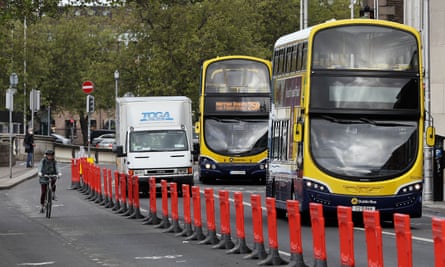
Authorities in Milan, among the most polluted cities in Europe, have said 22 miles of streets will be transformed over the summer as part of a scheme to reallocate space from cars to cycling and walking. Congestion in Milan, which is usually clogged with traffic, has fallen between 30 and 70% during the lockdown, and air pollution with it.
Rome’s council has approved the construction of 93 miles of temporary and permanent cycle routes as a way to be more sustainable while allowing people to adhere to physical distancing rules. As part of the government’s economic decree, people in towns and cities with populations of 50,000 or more will also be able to claim up to €500 toward the cost of a new bike. The payment also applies to scooters, electric bikes and Segways.
Last year’s Tour de France victory by the Colombian Egan Bernal precipitated a cycling boom in Bogotá. Hundreds of miles of public highways are closed to cars on Sundays, allowing cyclists to take to the roads free of exhaust fumes and the blare of car horns.
This enthusiasm has made it easier for the mayor, Claudia López, herself a keen cyclist, to introduce more bike lanes as part of plans to reduce public transport use to 35% of capacity in the country’s effort to tackle the pandemic. Fifty miles of new bike paths were announced last week, on top of the 300 already in place.
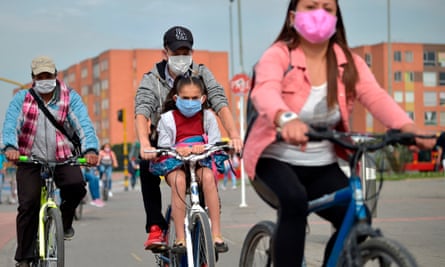
Announcing that 7,000 people were using the bike paths in the working-class south of the city, Bogota’s transport secretary, Nicolás Estupiñan, tweeted: “Every day more Bogotanos are getting on, and staying on, their bikes!”
Similar developments are taking place from Brussels to Sydney, while transport officials in many US cities report an “explosion in cycling”. From “slow streets” programmes in California to the progressive closure of many streets in New York, some cities have said they plan to make the changes permanent.
In Berlin it can take up to a decade to create a new bike lane, but during the coronavirus crisis, 14 miles of pop-up bike lanes, separated from car lanes by traffic beacons, have been introduced in anything from three to 10 days. Most will be here to stay, city officials have said, arguing that increasing numbers of Berliners – at the last count 43% – have no car, and that bikes will help lessen the burden on public transport.
The ADAC, Germany’s automobile association, has been highly critical of what it has called officials’ “exploitation of an emergency”, which has been taking place in cities across the country.
“The temporary reduction in car traffic, and incidentally bike usage as well, cannot be used to enforce the permanent reallocation of traffic space,” Volker Krane, of the ADAC, told German media. He said the bike lanes did little to ensure the safety of bike riders.
Even in some cities that have not introduced specific measures to encourage bikes, cyclists are making their presence felt. In the Jordanian capital, Amman, they spoke of the joy of seizing empty roads from the aggressive driving culture that normally dominates them, after cars were banned for about six weeks.
Reporting team: Helena Smith in Athens, Shaun Walker in Budapest, Kim Willsher in Paris, Rory Carroll in Dublin, Angela Giuffrida in Rome, Joe Parkin Daniels in Bogotá and Michael Safi in Amman
